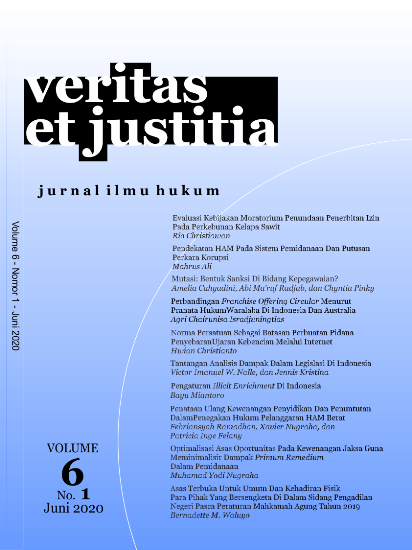PENGATURAN ILLICIT ENRICHMENT DI INDONESIA
DOI:
https://doi.org/10.25123/vej.v6i1.3884Abstract
The United Nations Convention against Corruption (UNCAC) provides states with the opportunity, by means of their national criminal law, to criminalize a number of diverse corruptive behaviors, inter alia, illicit enrichment. By using a legal normative approach, the author discusses the chances and obstacles Indonesia face when introducing illicit enrichment as a crime alongside other crimes regulated in the Law on (the eradication of) corruption and law re. Money laundering. Apparently the primary aim to criminalize illicit enrichment through the national criminal law is to provide the state with a legal instrument to recover assets the result of corruption or money laundering. Attention should be given, however, on a number of obstacles coming from the interpretation of presumption of innocence principle and exiting regulation on the obligation for government officials to report their assets.
References
Buku:
Harry Ponto, Surga Para Koruptor, Kompas, Jakarta, 2004.
Mukti Fajar, dkk. Dualisme Penelitian Hukum Normatif dan Empiris, Pustaka Belajar, Yogyakarta, 2010.
Romli Atmasasmita, Sekitar Masalah Korupsi: Aspek Nasional dan Aspek Internasional, Mandar Maju, Bandung, 2004.
Syed Hussein Alatas, Sosiologi Korupsi: Sebuah Penjelajahan dengan Data Kontemporer, LP3ES, Jakarta, 1983.
Jurnal:
Artidjo Alkostar, Urgensi Pengaturan Illicit enrichment and Trading In Influence untuk Meningkatkan Efektifitas Penegakan Hukum Tindak Pidana Korupsi. Disampaikan dalam acara Stadium General, Kamis, 4 Juli 2019 pukul 09.00 WIB di Ruang Sidang Utama lt. 3 Kampus FH UII.
Indonesian Corruption Watch,Implementasi dan Pengaturan Illicit enrichment (Peningkatan Kekayaan Secara Tidak Sah) di Indonesia, Policy Paper, 2014.
Lindy Muzila and partners, On the Take: Criminalizing Illicit enrichment to Fight Corruption, Stolen Asset Recovery (StAR) Series, The World Bank - UNODC, 2012.
Milda Istiqomah, Kebijakan Formulasi Pengaturan “Illicit enrichment” Sebagai Upaya Pemberantasan Tindak Pidana Korupsi, Jurnal Media Hukum Vol 23. No. 1 Juni 2016.
Radita Ajie, Kriminalisasi Perbuatan Pengayaan Diri Pejabat Publik Secara Tidak Wajar (Illicit enrichment) Dalam Konvensi Pbb Anti Korupsi 2003 (Uncac) Dan Implementasinya Di Indonesia, Jurnal Legislasi Indonesia, Vo. 12 No. 3, 2015.
Internet :
https://daerah.sindonews.com/read/1371653/174/zumi-zola-resmi diberhentikan-jadi-gubernur-jambi-1547809197
https://www.tagar.id/sepuluh-pejabat-indonesia-dengan-korupsi-miliaran-hingga-triliunan-rupiah
https://id.wikipedia.org/wiki/Laporan_Harta_Kekayaan_Penyelenggara_Negara
https://id.wikipedia.org/wiki/Komisi_Pemberantasan_Korupsi_Republik_Indonesia
https://antikorupsi.org/id/news/miskinkan-koruptor-lewat-aturan-illicit-enrichment
Peraturan Perundang-undangan
Undang-Undang Nomor 31 Tahun 1999 Jo. Undang-Undang Nomor 20 Tahun 2001 tentang Pemberantasan Tindak Pidana Korupsi;
Undang-Undang Nomor 28 Tahun 1999 Tentang Penyelenggaraan Negara yang Bersih dan Bebas dari Korupsi, Kolusi, dan Nepotisme;
Undang-Undang Nomor 30 Tahun 2002 Tentang Komisi Pemberantasan Tindak Pidana Korupsi;
Undang-Undang Nomor 7 tahun 2006 tentang Pengesahan UNCAC:
Undang-Undang Nomor 8 Tahun 2010 Tindak Pidana Pencucian Uang.
Downloads
Published
Issue
Section
License
Authors who publish with this journal agree to the following terms:
Authors retain copyright and grant the journal right of first publication with the work simultaneously licensed under a Creative Commons Attribution License that allows others to share the work with an acknowledgement of the work's authorship and initial publication in this journal.
Authors are able to enter into separate, additional contractual arrangements for the non-exclusive distribution of the journal's published version of the work (e.g., post it to an institutional repository or publish it in a book), with an acknowledgement of its initial publication in this journal.
Authors are permitted and encouraged to post their work online (e.g., in institutional repositories or on their website) prior to and during the submission process, as it can lead to productive exchanges, as well as earlier and greater citation of published work.
The Journal allow the author(s) to hold the copyright and to retian publishing rights without restrictions.






